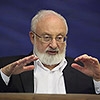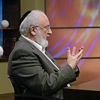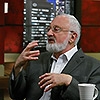Like A Bundle Of Reeds—Corrections Through The Ages, Part 2
 Like A Bundle of Reeds, Why Unity and Mutual Guarantee Are Today’s Call of the Hour, Michael Laitman, Ph.D.
Like A Bundle of Reeds, Why Unity and Mutual Guarantee Are Today’s Call of the Hour, Michael Laitman, Ph.D.
Chapter 3: Corrections Through the Ages
The Evolution of the Correction Method
The (Not Necessarily) Evil Inclination
When our sages write about Yetzer HaRah (evil inclination), they refer to the way we use envy to hurt others or to benefit at their expense. But if we use the above-mentioned envy, lust, and honor properly, they become our very means of correction. This is why the Holy Shlah wrote, “The worst qualities are envy, hatred, avarice, lust, and so forth, which are the qualities of the evil inclination—the very ones with which he will serve the Creator.”[i]
And yet, inherently, we use those inclinations negatively, as it is written (Genesis, 8:21), “The inclination of a man’s heart is evil from his youth.” Likewise, “There is no evil but the evil inclination,” wrote Shimon Ashkenazi,[ii] and centuries prior, Midrash Rabah established that “People are awash in evil inclination, as it is said, ‘For the inclination of a man’s heart is evil from his youth.’”[iii]
Abraham discovered that of all creations, only people possess an evil inclination. This is why the great Ramchal wrote, “There is no other creation that can do harm like man. He can sin, and rebel, and the inclination of a man’s heart is evil from his youth, which is not so with any other creature.”[iv]
Baal HaSulam writes that the evil inclination is the will to receive.[v] Yet, in previous chapters we said that the will to receive is the whole of Creation, and man constitutes the fourth, and most developed level of the will to receive. Why then is our will to receive the source of all evil?
The problem is that the will to receive on the speaking, human level is not static. It is constantly growing and constantly seeking more. In the words of our sages, “One does not leave the world with half of one’s wishes in one’s hand, for one who has one hundred desires two hundred; one who has two hundred desires four hundred.”[vi] Because we constantly seek more, we are always deficient. Likewise, the Holy Shlah says, “One who is not content is always lacking,”[vii] and is therefore constantly unhappy and dissatisfied. Looking at our consumer society, we can see that if we succumb to that element in our nature, we will be thrown into a “pleasure-hunt” that cannot end, but cannot make us happy, either.
Thus, Abraham realized that the evil inclination, the hatred and alienation that appeared among the Babylonians, was causing all the trouble among them, and that there was no hope that this ferment would wind down by itself. However, he also realized that having an intense will to receive was necessary for the completion of the purpose of Creation, for man to achieve Dvekut [adhesion, equivalence of form] with the Creator. In the words of Ramchal, completing the quote from above, “But on the other hand, when he [man] is corrected and complemented, he rises above all, and he deserves to adhere [cleave] to Him, and all other creations are dependent upon him.”[viii]
Therefore, instead of trying to annihilate the evil inclination, Abraham developed a method by which people could correct, or “tame” their inclinations, meaning their egos, and thus benefit from its growth. Once he devised the method, he began to share it with everyone, making no exceptions, as Maimonides testifies, “He began to call out to the whole world.”[ix]
As we mentioned in the Introduction, Maimonides wrote that Abraham “planted this tenet [that there is one God, one force in the world] in their hearts, composed books about it, and taught his son, Isaac.”
However, Abraham’s method was suitable only for his contemporaries. It could not, nor was it intended to be suitable for later generations. Because the evil inclination on the speaking level—the will to receive for ourselves, otherwise known as “egotism”—is ever growing and developing, by the time the people of Israel had grown into a nation and went out of Egypt, a new method of correction was required.
The three million or so who went out of Egypt were different from the seventy souls that had entered it two centuries earlier. In Egypt, Israel’s will to receive increased tremendously, and required a very explicit set of instructions in order to correct it.
[i] Rabbi Isaiah HaLevi Horowitz (The Holy Shlah), In Ten Utterances, “Sixth Utterance.”
[ii] Rabbi Shimon Ashkenazi, Yalkut Shimoni [The Shimoni Anthology], Micah, Chapter 7, continuation of intimation no. 556.
[iii] Midrash Rabah, Shemot [Exodus], Portion 30, Paragraph 17.
[iv] Ramchal (Rav Moshe Chaim Lozzatto), Daat Tevunot, 154, 165.
[v] Rav Yehuda Leib HaLevi Ashlag (Baal HaSulam), The Writings of Baal HaSulam, Shamati [I Heard], Article no. 5, “Lishma Is an Awakening from Above, and Why Do We Need an Awakening from Below” (Ashlag Research Institute, Israel, 2009), 518.
[vi] Midrash Rabah, Kohelet [Ecclesiastes], Portion 1, Paragraph 34.
[vii] Rabbi Isaiah HaLevi Horowitz (The Holy Shlah), “Gate of Letters,” Item 60, “Satisfaction.”
[viii] Ramchal (Rav Moshe Chaim Lozzatto), Daat Tevunot, 154, 165.
[ix] Maimonides, Yad HaChazakah (The Mighty Hand), Part 1, “The Book of Science,” Chapter 1, Item 3.










